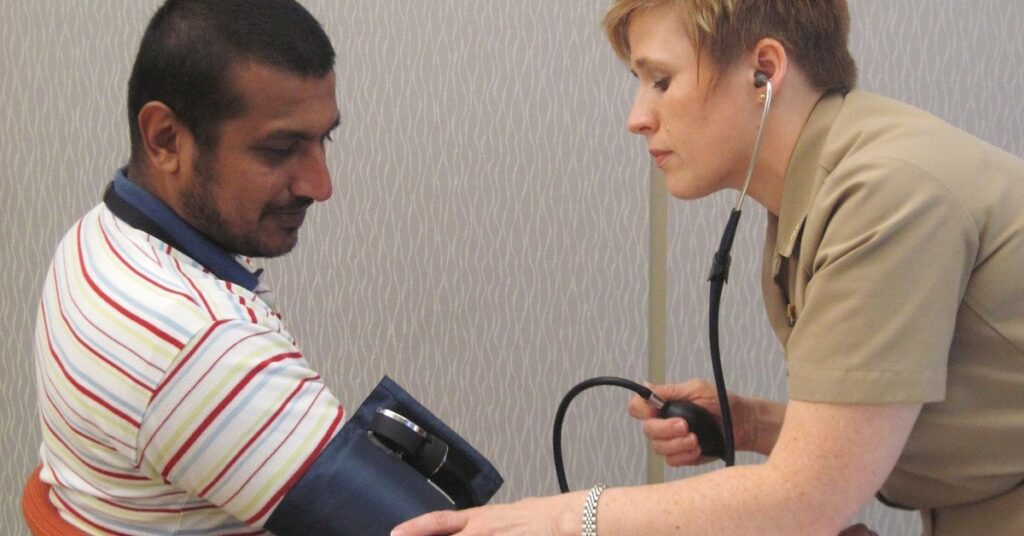
What Does a Family Nurse Practitioner Do?
Family nurse practitioners perform most of the same tasks as [...]

Tried to find a new physician lately? Depending on where you live, the search may well have proven quite challenging. A physician shortage has left the United States thousands of doctors low, and it’s only expected to get worse, Time magazine reports. “The physician shortage can justly be characterized as a looming public-health crisis,” says James Taylor, group president of the leadership solutions division at AMN Healthcare, the country’s largest healthcare staffing agency. A report from the Association of American Medical Colleges (AAMC) estimates that the shortage will range from 54,100 to 139,000 physicians by 2033.
Other healthcare providers will need to step in to take up the slack. Take nurse practitioners (NPs), for example. They can handle many of the same duties as doctors and physician assistants. They can perform physical exams, order and interpret tests, prescribe medications (in many but not all states), and develop treatment plans. NPs work in a variety of clinical settings, including hospital outpatient clinics, community centers, telemedicine, and private group or physician practices. Some states even allow NPs to open their own private practices.
Family nurse practitioner is by far the most popular NP specialization area, claiming about 70 percent of the nation’s more than 355,000 NPs practicing in the US today. How much do family nurse practitioners make? This article explores that question and also discusses:
A nurse practitioner is like a nurse on steroids. (Not literally, of course.) NPs are next-level nurses, nurses who have undergone advanced training and certification that allows them to assume greater responsibilities for patient care. Registered nurses (RNs) must earn a Master of Science in Nursing (MSN) or a Doctor of Nursing Practice (DNP) before becoming an Advanced Practice Registered Nurse (APRN).
In practice, three critical differences distinguish NPs from RNs. A nurse practitioner can:
The first nurse practitioners in the United States were certified in the 1960s; the position has since spread across the globe. The Journal of Pediatric Health Care notes that “there is a great need for development of this role to address the need for health promotion, disease prevention, and to provide for evidence-based care to the underserved populations of the world.” NPs play a particularly vital role in an era of physician shortages.
Healthcare providers can also cut costs by employing nurse practitioners. Their hourly rate is typically one-third to one-half that of physicians. They also reduce cost of care. A Tennessee study concluded that “NPs practicing in [the] state-managed managed care organization (MCO) delivered health care at 23 percent below the average cost associated with other primary care providers.”
Today, trained and certified NPs have a variety of career options, including:
As the name implies, family nurse practitioners (FNPs) provide family-focused healthcare to patients across the age spectrum, from infants to seniors. They focus on disease prevention and health promotion. “FNPs practice in a variety of healthcare settings, including
community health centers, private practice, healthcare systems, and universities,” according to the American Association of Nurse Practitioners (AANP). FNP responsibilities can range from educating patients to treating severe illnesses. They can further specialize by earning certifications in such areas as diabetes and pain management.
FNPs are “among the most compassionate and intimately connected providers in all of healthcare,” Johnson & Johnson reports. “If you enjoy working with patients every day, and building meaningful relationships, becoming a family nurse practitioner may prove to be an extremely rewarding career.”
FNP duties commonly include:
The U.S. Department of Labor lists many potential NP duties at O*NET OnLine. They include:
Estimates for FNP salaries vary from source to source, but most place the average salary in the low six figures. Salary.com gives a range of $109,000 to $127,000, with a $117,000 average. Payscale reports an average family nurse practitioner base salary of $99,000, plus bonuses and incentives ranging from $2,000 to nearly $50,000 per year, resulting in a total compensation range between $84,000 and $130,000 per year.
The U.S. Bureau of Labor Statistics offers a nurse practitioner salary range of $79,000 to $163,000, with a $121,000 average. AANP puts the national average income for FNPs at $115,000.
Comparably.com gives a lower average of $98,000 while noting considerable variations from city to city:
The states with the highest NP employment level and their annual mean wages, as ranked by the BLS:
Note that locations with higher annual salaries usually coincide with a higher cost of living. Specialty certifications in areas such as diabetes, cardiology, women’s health, and weight management can increase an FNP’s earning potential. Earnings typically increase with years of experience as well.
Becoming an RN is the first step toward becoming an FNP. Earning a Bachelor of Science in Nursing (BSN) can get you started on this career path, but you do not need an undergraduate degree in nursing. You will eventually need to earn an MSN or DNP; earning a BSN can expedite that process. Finally, you’ll need to meet licensing requirements in your state to become an APRN. Most RNs rack up a few years of work experience before embarking on the FNP path, though it’s possible to go straight into a graduate program after becoming an RN.
A number of schools offer an MSN degree with a family practitioner specialty, including the Yale School of Nursing in West Haven, Connecticut. Yale plans to launch an online FNP MSN program in the Fall of 2024.
.
Questions or feedback? Email editor@noodle.com

Family nurse practitioners perform most of the same tasks as [...]

You'll find FNPs in primary care clinics, hospitals, urgent care [...]

Top earners in substance abuse social work can earn over [...]

Successful healthcare organizations can only function with seasoned executive leadership [...]

Women's health care is a booming sector in the medical [...]
Categorized as: Nurse Practitioner, Nursing & Healthcare